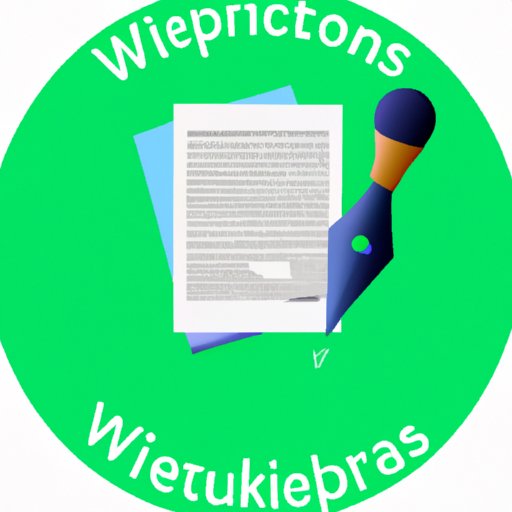Introduction
Are you interested in sharing your knowledge or expertise with the world by contributing to Wikipedia? As the world’s largest online encyclopedia, Wikipedia is powered by volunteer editors who create and edit content on a daily basis. However, if you’re new to the platform, you may feel overwhelmed or unsure of where to get started.
This article aims to provide a step-by-step guide on how to become a successful Wikipedia editor. From creating a Wikipedia account to conducting research and working with peer review groups, this article covers everything you need to know to get started.
Step-by-Step Guide
The first step to becoming a Wikipedia editor is creating an account. While it is possible to edit Wikipedia pages anonymously, creating a named account allows you to build a reputation and gain more trust from other editors. Once you’ve created an account, you can start editing existing articles or creating new content.
When editing existing articles, make sure to follow Wikipedia’s policies and guidelines. Always keep a neutral point of view, use reliable sources to support your claims, and avoid original research. If you see errors or bias in an article, you can fix it or suggest changes in the talk page.
Creating a new content page requires a bit more work. Before you start writing, make sure to search for similar pages to avoid duplicating content. You also need to have a good understanding of what makes a topic notable and how to structure a Wikipedia page. Creating a clear and informative lead section, putting keywords in bold, and using subheadings are all important when creating a new content page.
Understanding Wikipedia’s Policies and Guidelines
One of the most important things to understand as a Wikipedia editor is the policies and guidelines that all contributors must follow. Wikipedia’s policies are in place to maintain high standards of accuracy, reliability, and neutrality, while guidelines provide advice on best practices and how to interpret policies.
Some of the key policies and guidelines include the neutral point of view, reliable sources, notability, and verifiability. It’s important to understand these policies and guidelines before editing or creating content to avoid any confusion or mistakes.
Common mistakes to avoid include bias language, original research, plagiarism, and promoting a personal or commercial agenda. It’s also important to learn from others and participate in community discussions to gain feedback and different perspectives.
Conducting Research
Research is essential when creating accurate and trustworthy Wikipedia content. To find reputable and relevant sources, use databases like Google Scholar or academic journals to search for articles. You can also search for primary sources or use news articles to find current events.
When using sources, make sure to evaluate them for reliability and bias. Cross-checking with other sources and verifying the credentials of your sources can help ensure accuracy and credibility. Use sources to support your claims and arguments in a way that follows Wikipedia’s policies and guidelines.
How to Get Started with Peer Review
Peer review is a process of receiving feedback from other contributors that can help improve articles. There are several places to find peer review groups, such as WikiProjects, talk pages, or the Teahouse. It’s essential to introduce yourself and ask for feedback on your article, but also to respond to feedback and incorporate it into your writing effectively.
Peer review can also help with networking and building relationships with other editors. By participating in peer reviews and discussing articles, you can learn from others and share your own expertise.
Time-Saving Strategies for Wikipedia Editors
Editing and creating Wikipedia content can be time-consuming, but there are various strategies to make the process more efficient. Useful tools and resources for editing and writing on Wikipedia include the VisualEditor, WikiEd, or Citation Hunt.
You can also use goal-setting strategies, templates, and to-do lists to stay organized and prioritize your tasks. It’s important to balance quality and quantity in your editing and writing. Focusing on key topics, prioritizing sources, and avoiding burnout can help you maintain consistency and quality.
Community Building
The Wikipedia community is a vital aspect of contributing to Wikipedia. Building relationships with other editors can help you learn more and feel supported. Attending meetups, participating in WikiProjects, joining Facebook groups, or contributing to discussions are all ways to network and build community.
Contributing to the community’s success by helping other editors, sharing your expertise, and participating in discussions can also help you establish your reputation as a knowledgeable and respected editor.
Conclusion
As you can see, becoming a successful Wikipedia editor requires a variety of skills and strategies. By following these step-by-step guidelines, understanding Wikipedia policies and guidelines, conducting research, getting started with peer review, using time-saving strategies, and building a community with other editors, you can become a valuable contributor to Wikipedia.
Remember, Wikipedia is an ever-evolving platform, and there’s always something new to learn. Don’t be afraid to make mistakes and learn from others.
(Note: Is this article not meeting your expectations? Do you have knowledge or insights to share? Unlock new opportunities and expand your reach by joining our authors team. Click Registration to join us and share your expertise with our readers.)
